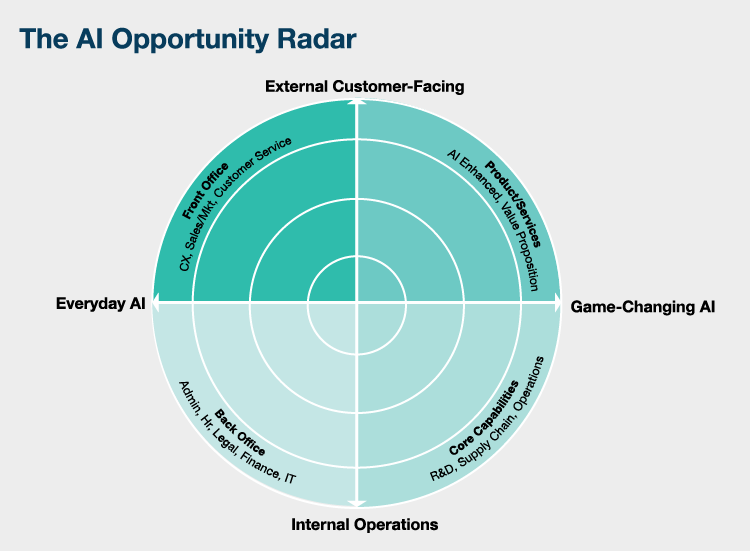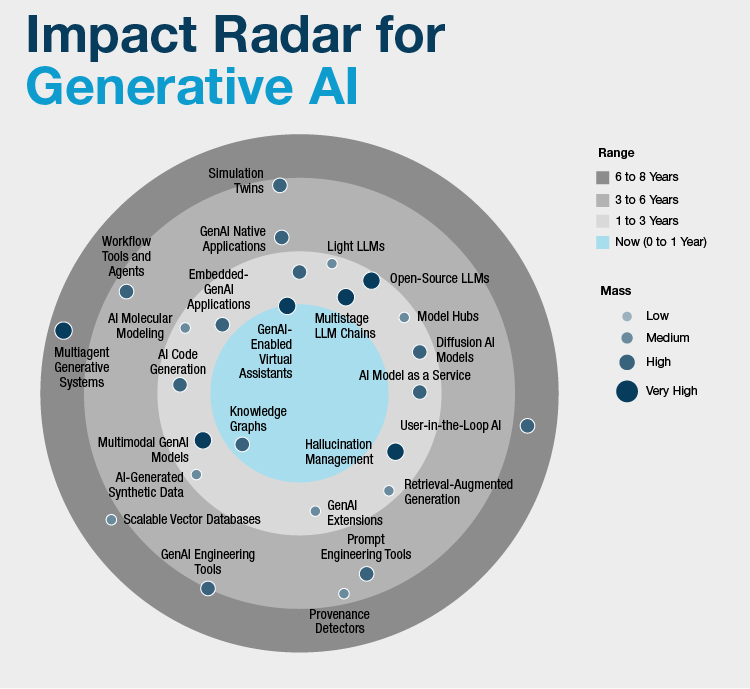Services
The tide of Artificial Intelligence (AI) is rapidly reshaping industries, and traditional Information Technology (IT) companies are no exception. While IT has long been at the forefront of technological innovation, the rise of AI presents a unique challenge: the AI talent gap. This gap refers to the growing disparity between the demand for skilled AI professionals and the limited pool of qualified workers. To stay relevant in this new era, IT companies must prioritize upskilling their existing workforce and embrace a culture of continuous learning.
There are several factors that contribute to the AI talent gap :
Rapidly Evolving Field : AI is a fast-paced domain with constant advancements. Current IT skillsets might not translate directly to working with AI tools and algorithms.
Specialized Skillset : Working with AI requires a unique blend of technical knowledge (machine learning, data science) and soft skills (critical thinking, problem-solving). Finding individuals with both can be difficult.
Limited Educational Focus : Traditional IT education may not adequately cover the intricacies of AI. Universities and training institutions are still adapting their curriculums.
Failing to address the AI talent gap can have severe consequences for IT companies :
Missed Opportunities : Businesses won't be able to leverage AI's potential for automation, process optimization, and data-driven decision-making.

Competitive Disadvantage :
Companies that don't adopt AI risk falling behind competitors who embrace this technology.

Innovation Stagnation : Without an AI-equipped workforce, IT companies might struggle to develop innovative solutions for their clients.
The good news is that the AI talent gap can be bridged through strategic upskilling initiatives. Here's how IT companies can approach this challenge :
Skills Gap Analysis : Assess the current skillset of your IT workforce and identify areas where AI knowledge is lacking.
Tailored Training Programs : Design training programs that equip employees with the technical and soft skills required to work with AI effectively.
Microlearning Opportunities : Provide bite-sized learning modules on relevant AI topics to allow for flexible learning schedules.
Mentorship Programs : Pair experienced data scientists and AI specialists with less experienced employees to facilitate knowledge transfer.
External Collaboration : Partner with universities or training providers offering specialized AI courses for your workforce.
Beyond Skills : Foster an AI-Driven Culture.
Leadership Buy-in : Senior leadership must champion AI adoption and provide resources for upskilling initiatives.
Change Management Strategy : Address employee concerns about job displacement and emphasize the complementary role of humans and AI.
Internal Knowledge Sharing : Create platforms for employees to share their AI knowledge and learnings with colleagues.
How Developers Can Upskill to Stay Relevant in the Age of AI : Developers are inherently adaptable. Here's how developers can upskill to not only survive but thrive in this exciting new era:
From Code Warriors to AI Collaborators :
The days of developers toiling away in solitude, crafting line after line of code, are fading. AI is poised to become a powerful co-pilot, automating tedious tasks like code generation, bug identification, and even unit testing. This frees developers to focus on the more strategic aspects of software creation – designing complex systems, solving intricate problems, and ensuring code quality remains high.
To thrive in this collaborative environment, developers will need to develop strong communication and teamwork skills. They'll need to be able to clearly explain their goals and expectations to AI assistants, interpret the insights AI provides, and seamlessly integrate AI-generated code into existing projects.
Embrace Explainable AI (XAI) :
As AI becomes more integrated into development workflows, understanding its "why" becomes paramount. This is where XAI comes in. XAI techniques allow developers to peer into the black box of AI algorithms, understanding how they arrive at decisions. This is crucial for debugging AI-generated code, ensuring its fairness, and building trust in AI-powered systems.
Developing an understanding of XAI principles and methodologies will be key for developers in the coming years. This will empower them to not only leverage AI effectively but also ensure the responsible development and deployment of AI-powered solutions.
Sharpen Your Soft Skills :
While technical skills remain essential, the future of software development will place a premium on soft skills. Developers who can effectively communicate complex technical concepts to non-technical stakeholders, collaborate seamlessly across diverse teams, and think critically to solve problems will be highly sought after.
Honing soft skills like critical thinking, problem-solving, creativity, and communication will be crucial for developers to bridge the gap between the technical world and the business needs they serve.
Become an Ethical Developer :
The rise of AI brings with it a new set of ethical considerations. Developers will need to be aware of potential biases that can creep into AI algorithms through data sets or design choices. They'll need to be champions for responsible AI development, ensuring fairness, transparency, and accountability in the systems they create.
Building an understanding of ethical AI principles and best practices will be essential for developers in the future. This will allow them to contribute to the creation of AI solutions that benefit everyone, not just a select few.
Lifelong Learning is Key:
The world of AI is constantly evolving. New advancements, tools, and methodologies are emerging at a rapid pace. To stay relevant, developers must embrace a culture of lifelong learning. This might involve taking online courses, attending workshops, participating in hackathons, or even pursuing certifications in specific AI domains.
By actively seeking out new knowledge and staying abreast of the latest trends, developers can ensure their skillset remains valuable in the ever-changing AI landscape.
The AI talent gap presents an opportunity, not a threat. By upskilling in the right areas, developers can transform themselves from code warriors into AI collaborators, shaping the future of software development and ensuring their continued relevance in this exciting new era.
Mphasis has launched several initiatives, including Mphasis.ai, talent development programs, and cloud platforms to fast-track AI adoption :
Mphasis.ai : This is Mphasis' dedicated AI platform that offers a suite of AI tools and services. Mphasis.ai helps clients leverage AI for various tasks like data analysis, automation, and machine learning.
AI Training Programs : Mphasis recognizes the importance of building an AI-ready workforce. They offer AI-specific training programs to equip their employees with the skills and knowledge needed to develop and implement AI solutions.
TalentNext : This program focuses on developing future-ready talent at Mphasis. It equips employees with skills in emerging technologies like AI, cloud computing, and data science.
Digital Natives : This initiative targets attracting and retaining young, tech-savvy talent. Mphasis recognizes the value of digital natives' fresh perspectives and innovative thinking in the AI and digital transformation landscape.
GeekCloud :
Mphasis GeekCloud is a cloud-based platform that provides access to AI tools, resources, and expertise. This allows Mphasis to offer scalable and efficient AI solutions to clients.
By combining these initiatives, Mphasis is actively adopting AI and digital transformation strategies. They are not only developing AI-powered solutions but also building a future-proof workforce with the skills to drive innovation.
Generative AI Services : This includes Generative AI Advisory, AI App Development, and Large Language Model (LLM) fine-tuning. They can help clients brainstorm new ideas using AI and develop custom AI applications.
Machine Learning Expertise : Mphasis offers services like Reinforcement Learning Based Conversation Design and Industry-Specific Model Development. This indicates their capability to build chatbots and machine learning models tailored to specific industries.
Data Services : Mphasis provides services like Data Prepping and Factuality Evaluation. This suggests they can help clients prepare data for AI projects and ensure the accuracy of AI outputs.
Testing and Implementation : Mphasis.ai includes LLM Application Testing, which implies services to test and ensure the functionality of AI applications. Overall, Mphasis.ai focuses on using Generative AI to help businesses achieve efficiency and innovation. They offer a range of services to support the entire AI development lifecycle, from ideation to implementation.
In conclusion, the rise of AI presents a double-edged sword for traditional IT companies. While it disrupts established models, it also unlocks immense potential. By prioritizing continuous learning, fostering an AI-centric culture, and investing in upskilling their workforce, IT companies can bridge the talent gap and capitalize on the power of intelligent automation. This necessitates a proactive, strategic approach, but the rewards are substantial – a future-proofed workforce equipped to harness the transformative power of AI. Mphasis exemplifies this proactive approach, establishing itself as a leader in AI solutions by embracing generative AI and adapting to the ever-evolving market landscape.